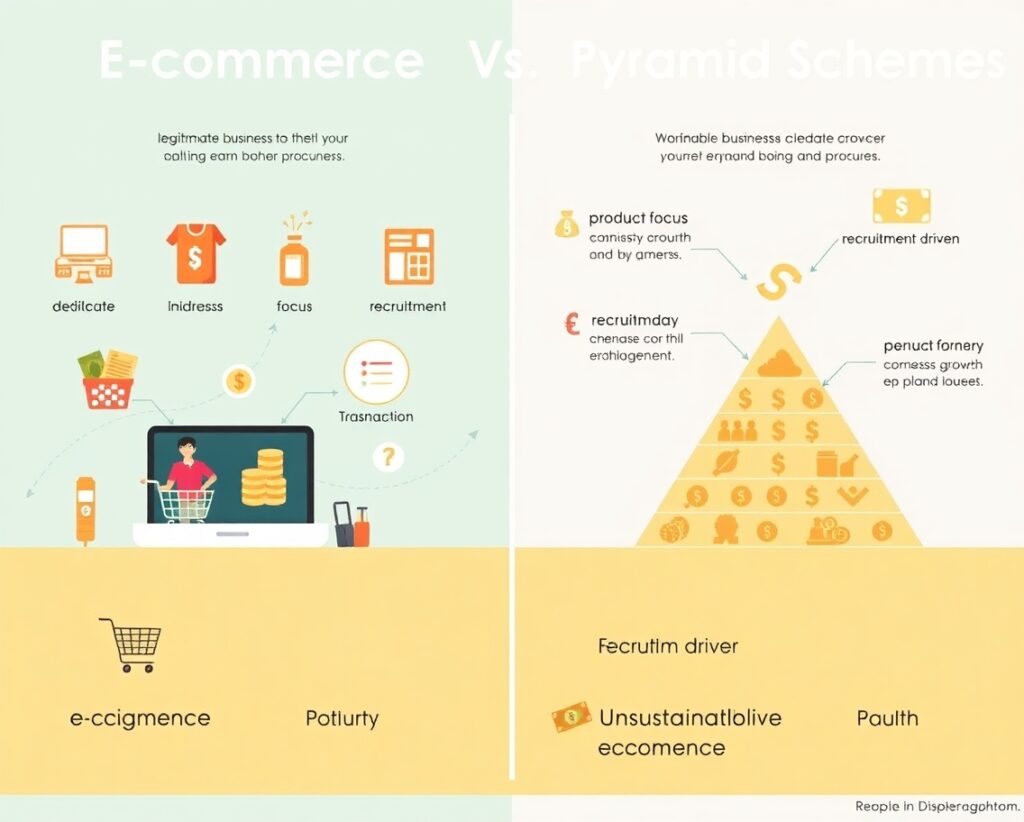E-commerce has changed the way we shop and do business, with billions of people buying online. However, some wonder if e-commerce is similar to pyramid schemes.
In this article, we’ll explore the question “Is e-commerce a pyramid scheme?”, clarify key differences between legitimate e-commerce and pyramid schemes, debunk common myths, and share tips for success in online business.
What is E-commerce?

E-commerce refers to the buying and selling of goods and services over the internet. It encompasses a wide range of activities, from selling physical products to offering digital downloads or services.
E-commerce businesses operate through online platforms or websites and rely on customer transactions to generate revenue.
The key to e-commerce is legitimate exchanges: buyers receive products or services in return for payment.
Unlike pyramid schemes, the focus is on creating value through goods and services rather than through recruitment or investment.
What is a Pyramid Scheme?
A pyramid scheme is an illegal business model that primarily relies on recruiting individuals to invest money, promising them high returns if they recruit others to do the same.
Participants at the top of the pyramid receive financial rewards from the investments made by new recruits. The model depends on a constant influx of new members to sustain profits, making it unsustainable in the long term.
Key characteristics of pyramid schemes include:
- Recruitment over sales: Participants earn more money from recruiting others than from selling products.
- Lack of genuine products or services: Many pyramid schemes offer no actual product, or the product is simply a façade to mask the illegal nature of the business.
- Unsustainability: Pyramid schemes collapse when recruitment slows down because there are not enough new members to sustain the system.
Is E-commerce a Pyramid Scheme? Debunking the Myths
Myth 1: E-commerce is Just Like a Pyramid Scheme
One of the biggest misconceptions is that e-commerce operates in a pyramid-like structure. This is false. In e-commerce, the core focus is selling products or services directly to consumers.
While pyramid schemes thrive on recruitment, e-commerce thrives on providing value through real transactions.
Unlike pyramid schemes, e-commerce businesses generate income through actual sales, not by enrolling others into the business.
Sellers earn money by delivering goods or services to customers who are willing to pay for them. Recruitment is not necessary in legitimate e-commerce.
Myth 2: E-commerce Relies on Endless Recruitment
Some critics argue that e-commerce models are similar to pyramid schemes because they rely on recruiting new sellers or affiliates to make money.
However, recruitment in e-commerce is typically done through affiliate marketing, which is different from pyramid schemes.
In affiliate marketing, affiliates earn commissions by referring customers to legitimate products or services. The main focus is still on the sale of products, not the recruitment of new affiliates.
Myth 3: E-commerce Only Benefits a Select Few
There’s a belief that only those at the top of the e-commerce pyramid (such as owners of large platforms) make substantial profits.
While it’s true that some e-commerce businesses are more successful than others, anyone can start an e-commerce business, and success depends on factors like product quality, marketing strategy, and customer service.
Unlike pyramid schemes, which only benefit those at the top, e-commerce offers opportunities for entrepreneurs to succeed based on the value they offer to customers, not their position in the business hierarchy.
Key Differences Between E-commerce and Pyramid Schemes

| Aspect | E-commerce | Pyramid Scheme |
|---|---|---|
| Primary Focus | Selling products or services online | Recruitment and investment |
| Income Source | Revenue from sales to customers | Earnings from new recruits’ investments |
| Sustainability | Sustainable through quality products and services | Unsustainable, collapses when recruitment slows |
| Legality | Legal and regulated | Illegal in most countries |
E-commerce Business Models vs. Pyramid Schemes
E-commerce comes in various forms, and some may appear similar to pyramid schemes at first glance, especially in multi-level marketing (MLM) models. However, it’s important to distinguish between these models.
Direct E-commerce Sales
In a direct e-commerce business, entrepreneurs sell products directly to consumers. Examples include online stores, dropshipping, and subscription-based models. The focus here is on offering a valuable product, not recruiting other sellers.
Multi-Level Marketing (MLM) and Affiliate Marketing
While MLMs can sometimes appear similar to pyramid schemes, they are distinct because they typically involve selling actual products.
Participants earn commissions based on sales rather than recruitment. However, when the emphasis shifts too heavily toward recruitment, some MLMs may cross into the territory of pyramid schemes.
Legal Implications of Pyramid Schemes and E-commerce
Operating a pyramid scheme is illegal in most countries. The Federal Trade Commission (FTC) in the United States, for example, actively works to shut down pyramid schemes. Violating anti-pyramid scheme laws can lead to heavy fines, restitution to victims, and even imprisonment.
In contrast, e-commerce is a legitimate business model as long as it complies with local laws, such as consumer protection, taxation, and product quality regulations. Entrepreneurs must ensure their e-commerce business is ethical and transparent.
Real-World Examples of Pyramid Schemes in E-commerce
Amway
Amway is one of the most well-known MLM companies that has often been accused of operating like a pyramid scheme.
However, the company claims to offer legitimate products and services. The controversy arises from the emphasis on recruitment rather than product sales, which can make it resemble a pyramid scheme.
Fiverr (2014)
Fiverr, an online marketplace for freelance services, was temporarily linked to pyramid scheme allegations in 2014 when it was discovered that some sellers were requiring participants to pay upfront fees in exchange for recruitment bonuses.
This case highlights the potential risks of blurred lines between legitimate e-commerce and pyramid schemes.
How to Identify a Pyramid Scheme in E-commerce

If you’re considering entering an e-commerce business, here are some red flags to watch for:
- Focus on recruitment: If the business model emphasizes recruiting others over selling products, it may be a pyramid scheme.
- No tangible product or service: If the products offered are of little value or hard to evaluate, this could indicate a scam.
- High upfront costs with no clear return: Legitimate e-commerce businesses typically have low startup costs and don’t demand substantial upfront payments.
Conclusion
To summarize, e-commerce is a legitimate business model based on the buying and selling of products or services online.
It differs significantly from pyramid schemes, which focus on recruitment and investment rather than the exchange of goods or services.
While some business models like MLMs may have similarities to pyramid schemes, they are fundamentally different when recruitment is not the primary source of income.
If you are interested in starting an e-commerce business, ensure you are focusing on providing real value to customers, offering quality products, and using ethical marketing practices. By following these principles, you can build a successful and sustainable online business.
FAQS
Is e-commerce a pyramid scheme?
No, e-commerce is a legitimate business model focused on selling products or services online, whereas pyramid schemes rely on recruitment for profits.
How can you tell if an e-commerce business is a pyramid scheme?
Look for signs like excessive focus on recruitment, no tangible products, and high upfront costs without clear returns, which are indicators of a pyramid scheme.
Are MLMs the same as pyramid schemes?
MLMs (Multi-Level Marketing) can resemble pyramid schemes but are distinct if they focus on actual product sales rather than recruitment for income.
What makes e-commerce different from a pyramid scheme?
E-commerce involves selling products or services directly to consumers for profit, while pyramid schemes rely on new participants’ money to sustain profits.
Is affiliate marketing a form of pyramid scheme?
No, affiliate marketing is a legitimate business practice where affiliates earn commissions by promoting products. The focus is on sales, not recruitment.
Can e-commerce businesses fail like pyramid schemes?
E-commerce businesses can fail, but unlike pyramid schemes, they do not rely on unsustainable recruitment models. Success depends on product demand and business strategies.
Are there legal consequences for running a pyramid scheme?
Yes, running a pyramid scheme is illegal in many countries, including the U.S., where offenders may face fines, penalties, and even jail time.
Can anyone start an e-commerce business?
Yes, anyone can start an e-commerce business, but success depends on factors like the quality of products, marketing strategies, and customer service.



